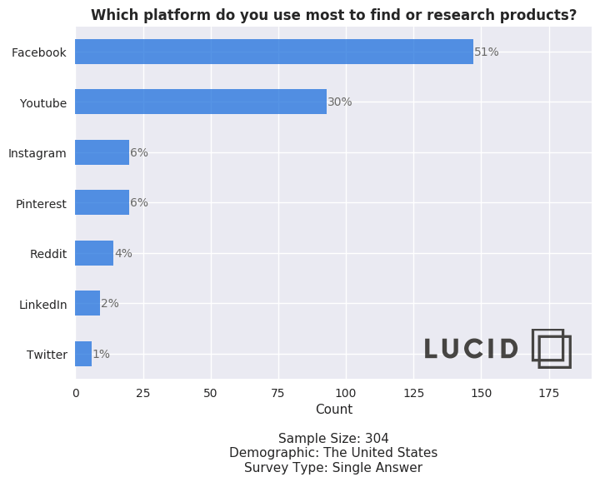Where do Shoppers Research Products? We Asked 300 Consumers [New Research]
In 2018, 40% of people used social media channels for aspects of product research.
With younger generations getting more and more connected to social media platforms, the amount of product research done on these platforms is likely to grow. In fact, 16 to 24-year-olds already conduct product research more on social than search engines.
Throughout the past few years, social media channels have embraced their new role as product research platforms, devoting certain areas or features of their platforms to brands and products.
Download Now: HubSpot's Annual State of Marketing Report
For example, Facebook Ads is considered an alternative to Google Ads, YouTube is a go-to site for learning about new products, Instagram offers Shoppable posts, and Reddit users regularly participate in discussion threads about products. Meanwhile, Pinterest continues to position itself as a tool for advertisers by improving its ad software.
With all the social media platforms and product marketing opportunities out there, it might be hard to drill down on which platforms are key to your product marketing strategy.
By now, you might be on all the major social media platforms. But, as they expand and evolve, you might still wonder which you should focus your time and efforts on if you're selling a physical product. To determine this, it can be helpful to find out which social channels your specific audience is using to look for products, and then create social strategies that meet them where they are on their preferred platforms.
To learn more about the social networks people prefer to surf for product research, I conducted a poll of 304 people using Lucid Software.

Source: Lucid Software
When asked which channel they turned to most often for product research, 51% of respondents said Facebook.
This result isn't shocking. Facebook is the second-most used social platform globally, followed by YouTube. Since Facebook is one of the first and most successful social media platforms, you probably should be marketing your brand or products on it if you aren't already. But, you definitely shouldn't count out other platforms -- like Instagram or Pinterest -- just yet.
Below, I'll give you a rundown of the opportunities each social network listed in the poll above offer when it comes to marketing physical products. I'll also highlight the key differences that you'll want to consider when weighing which social product marketing strategies are right for you.
Which Social Media Platform Should You Market Products On?
Facebook has a whopping 1.59 billion daily active users and has been around since the early 2000s. Its audience includes multiple age groups and spans the globe, making it a solid place for most brands to market themselves.
When it comes to marketing your product, you have many different options on Facebook. Here are a few examples.
Free Promotion
By now, you probably know that any company can create a Facebook Business Page for free. Once you create a business page, you can begin to share posts about your products and offerings. If you have happy customers, you can even ask them to review your business on Facebook so prospects researching you can see how you've pleased your customers in the past.
Aside from creating a page to highlight your brand, you can also post your products in Facebook's Marketplace. Marketplace listings can include product shots, pricing, product specifications, and purchasing information. Although individual users often use the Marketplace to sell items they no longer want to other people, Facebook Business pages are also eligible to use this feature.
You can also consider talking about your products or offerings on Facebook Stories. This might take a little extra effort because it will require you to film or create content in the Story format, but research says it can be beneficial. In fact, a 2018 survey revealed that 62% of people were more interested in a product after learning about it in a Facebook Story.
Comments
Post a Comment